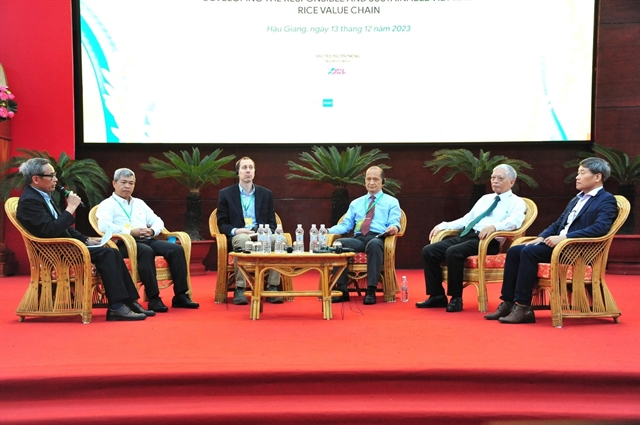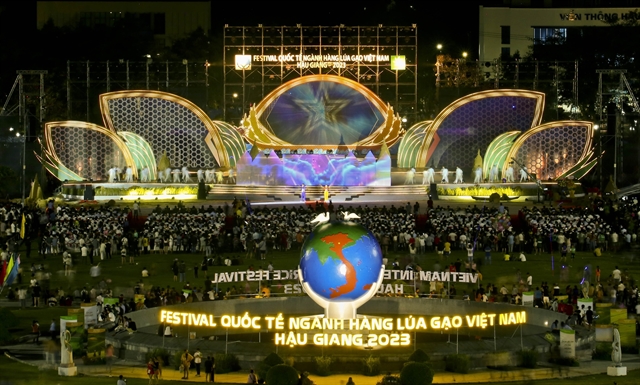 Economy
Economy


|
| A panel discussion as part of the conference on “Developing the responsible and sustainable Vietnam rice value chain” in Hậu Giang on December 13. — VNA/VNS Photo |
HẬU GIANG — Improving farmers’ incomes and switching to green production to adapt to climate change are among the things Việt Nam needs to do make its rice farming sustainable, a conference heard in Hậu Giang Province on December 13.
Attendees at the “Developing the responsible and sustainable Vietnam rice value chain” conference agreed about the country’s outstanding accomplishments in rice production in recent years, which have ensured national food security and made it one of the world's top exporters of the grain.
Deputy Minister of Agriculture and Rural Development Hoàng Trung said Việt Nam grows 26-28 million tonnes of rice a year, 20 million for domestic consumption.
Some 7.8 million tonnes were exported in the first 11 months of this year for a record US$4.4 billion, and the numbers would keep rising, he said.
But delegates said the sector faces many challenges like the current volatility in the global market, changes in consumer tastes and the impacts of climate change, requiring it to improve rice quality, reduce costs, adapt to climate change, reduce greenhouse gas emissions, expand markets, and build a sustainable brand for itself on the international market.
Cao Đức Phát, Chair, Board of Trustees of the International Rice Research Institute, said there are three major challenges the global rice industry faces: the need to increase production for a growing population, improve rice farmers’ incomes and adapt to climate change while reducing greenhouse gas emissions.
Việt Nam too faces the latter two, he said.
“If there are no changes, the rice industry will not be able to develop sustainably.”
A project to grow high-quality, low-emission rice on one million hectares in the Mekong Delta by 2030 launched by the Ministry of Agriculture and Rural Development on December 12 marks great progress for the sector, he said.
Vietnamese farmers have around 0.6 hectares of land per household on average. They need to be trained in new production methods in line with market requirements and supported with getting bank loans, he added.
Lê Thanh Tùng, deputy director of the Crop Production Department, said in the Mekong Delta rice production faces challenges related to water availability since floods no longer occur like clockwork like they used to and saltwater intrusion is increasing.
So it is necessary to invest more in infrastructure, adopt comprehensive technical solutions to reduce emissions and trade carbon credits, he said.
Assoc Prof Dr Nguyễn Phú Son of Cần Thơ University listed 10 main bottlenecks in developing a rice value chain, including the lack of sharing of risks and benefits between various stakeholders in it, loose linkages between farmers and businesses, small scale of production, and the lack of a large database.
The lack of the database affects the ability to forecast the market and manage the sector well to optimise the gap between supply and demand, he said.
To resolve the bottlenecks and develop the rice value chain, he called for developing concentrated growing areas for high-quality rice towards sustainability and green growth, developing sustainable linkage models between stakeholders, cutting costs to improve competitiveness, and researching to develop Việt Nam’s common rice varieties and brand.
Others called for embracing mechanisation since the workforce in rice production and supporting industries is ageing.
Foreign delegates shared their experiences, lessons and initiatives and expressed support for million-hectare programme.
The conference was organised by the Ministry of Agriculture and Rural Development and Hậu Giang Province within the framework of the 2023 Việt Nam-Hậu Giang International Rice Festival.
In box:
2023 Việt Nam-Hậu Giang International Rice Festival opens

|
| The opening ceremony of the 2023 Việt Nam-Hậu Giang International Rice Festival on December 12. — VNA/VNS Photo |
HẬU GIANG — The 2023 Việt Nam-Hậu Giang International Rice Festival, with the theme “Centennial Journey of Vietnamese Rice,” opened in the namesake Mekong Delta province on December 12.
The four-day event takes place at a time when Việt Nam is aiming to become a pioneering nation in high-quality, low- emission rice production and green and sustainable development, and is embarking on a programme to grow one million hectares of such varieties in the Mekong Delta by 2030.
It also presents an opportunity to showcase the country’s potential in rice production and stimulate trade in the grain, conveying a message to the world about a responsible country.
In a speech he made online from Hà Nội, Prime Minister Phạm Minh Chính said the festival aims to popularise the images of Việt Nam, its friendly and hardworking people and a rice culture that spans thousands of years.
Việt Nam is the first country to embark on such a million-hectare rice programme to improve people’s lives and demonstrate its responsibility towards the global community in tackling climate change and developing low-emission agriculture.
Minister of Agriculture and Rural Development Lê Minh Hoan said creating a responsible production and business environment and actively contribute to global food security have always been strategic goals and commitments for Việt Nam’s rice sector amid its global integration.
The festival has booths introducing rice products, culinary delights made from the grain, machinery and equipment used in rice farming, and One Commune One Product items.
There is also an exhibition titled "Vietnam's Rice Road" along the Xà No canal that traces the journey Việt Nam has made in rice cultivation.
Other activities include demonstrations of agricultural machinery and equipment for tasks such as spraying pesticides and sowing, mechanised seeding technologies, a circular agricultural model using straw, and a smart rice cultivation model.
Conferences and workshops on Việt Nam-Africa policy dialogue, South-South cooperation, support for the transformation of the food system, developing the responsible and sustainable Vietnam rice value chain, the global rice situation, and upcoming trends are also on the agenda. — VNS




